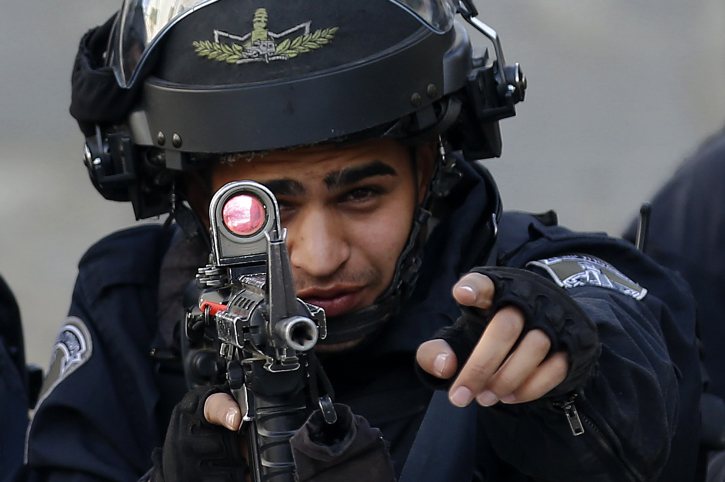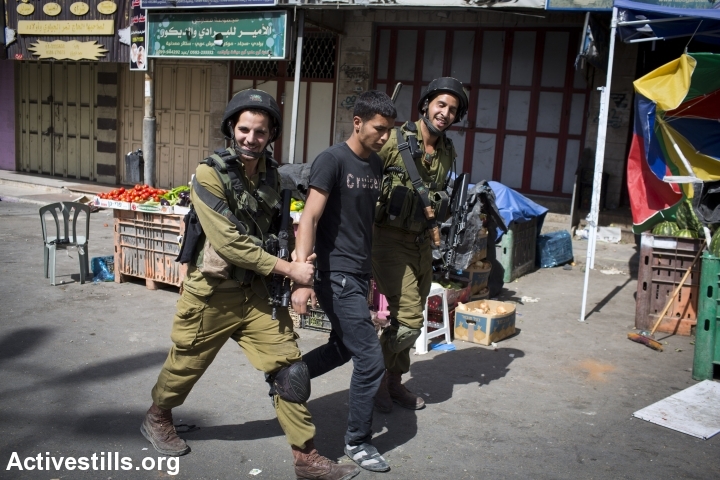Mizrahim are forced to carry out the dirty work of the occupation, coming face to face with their Palestinian subjects in the West Bank. It doesn’t have to be this way.

It is hard to know for sure what kind of considerations are at the heart of the growing crisis between Prime Minister Benjamin Netanyahu and Avigdor Liberman, which may result in snap elections, should they not be able to form a coalition together.
But there is something almost ludicrous about the fact that they are unable to agree upon an issue that, in all respects, is one of the biggest collective frauds in our public discourse: forced conscription for ultra-Orthodox Israelis.
The fraud starts with the notion that one could ever deign to designate the Israeli army as a “people’s army” through forced conscription of all its citizens. The “people,” of course, refers to Israel’s Jewish citizens alone; Palestinian citizens of Israel have no part in this story, anyway.
But even among Jewish Israelis, forced conscription is far from being a consensus issue. Professor Yagil Levy, who researches the relationship between the army, politics, and Israeli society says that the struggle to enlist the ultra-Orthodox, the majority of whom refuse to serve in the IDF, represents the downfall of the notion of the “people’s army.” And while that term has been emptied of all real meaning, the unrelenting demand to conscript all Jewish Israelis has made the career of a number of cynical and opportunistic politicians.
There is no reason, then, why we should not broaden the conversation on forced conscription to other groups in Israeli society, including Mizrahim (Jews from Arab and/or Muslim countries).
Alongside the lie of a “people’s army,” Israel’s militaristic ethos has helped bolster the deception of the role of the military as the great equalizer of Israeli society — the admission ticket to Israeliness itself. But the tracking of Mizrahim — which begins in the neglected neighborhoods and development towns of the country’s periphery and continues with the sending of many Mizrahi teenagers to vocational schools — continues in the IDF.
There, they are sent to take part in policing and fighting against Palestinians in the occupied territories, while middle and upper-class Israelis tend to serve in special units. As with educational opportunities, in the army, Mizrahim are sent to the periphery to serve as the black labor at the bottom of the hierarchy. This has only intensified with the organized blitz by the national-religious community on high-ranking positions in the army.
It is true that while in the IDF, as opposed to Israel’s legal or political establishment, Mizrahim have greater social mobility that allows them to reach the top of the pyramid. But this is the flip side of the same tragedy: it is a system in which the option of rising in the ranks is inextricably tied with de-Arabizing Mizrahi identity, while adopting the image of a mista’arev (undercover soldiers who pass as Arabs) as a model. That, in a nutshell, has been the Mizrahi story vis-a-vis Zionism for the past seven decades: oppression and discrimination because of the Arab component in Mizrahi identity, while promising that if Mizrahim simply do away with any signs of Arabness all while developing a burning hatred toward Arabs, their chances of joining the club will increase.
This destructive dynamic was a significant part of the process by which wide swaths of the Mizrahi public adopted hawkish right-wing politics (alongside sins committed by the left). But in the army, this dynamic takes an even more tragic turn: enlisting Mizrahi identity as a weapon of self-destruction. This can be seen, for instance, in the form of the Mizrahi mista’arevim, who are sent to the occupied territories and use their Arab appearance to go to war against other Arabs — and thus against their own Arabness.

This tendency can also be seen in the use of the Arabic language in the army. As Dr. Yoni Mendel pointed out in a petition by Mizrahi Israelis against the Jewish Nation-State Law, Arabic in Israel has undergone a “securitization;” as the language was stripped of its cultural legitimacy, Arabic was taken away from Mizrahi Jews who wished to distinguish themselves from the negative connotations that were forced upon them. Meanwhile, Arabic was given legitimacy only in the context of “national security” — issues that revolved around intelligence or hasbara. In other words, Mizrahim destroy their own Arab identity by enlisting Arabic for the purpose of fighting the “other Arab.”
The attack on Mizrahi identity within the army cannot be undone inside that very system. The attempt to try and effect change within the military itself means working to ensure that Mizrahi soldiers can climb the ladder and sit in air-conditioned rooms while sending others below them in the pyramid to do the dirty work. The ultra-Orthodox understand that enlistment will corrupt the central identity and values of their community, and thus are waging a fierce ideological battle against it. There is no reason why Mizrahim should not think similarly about what conscription does to our community.
This article was first published in Hebrew on Local Call. Read it here.

